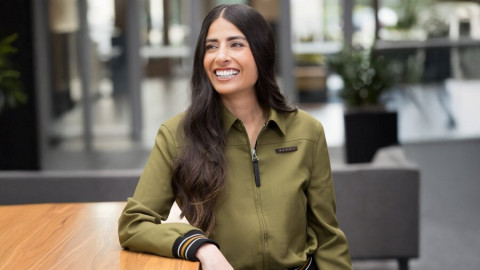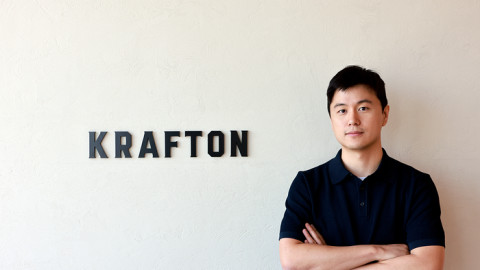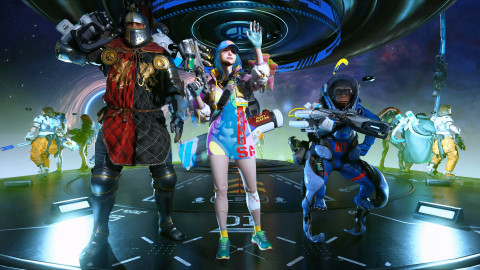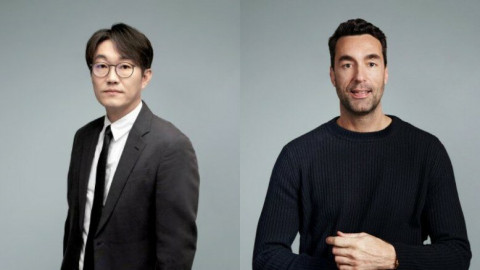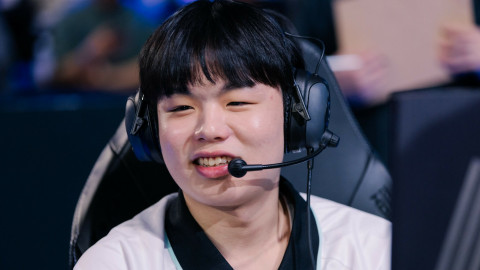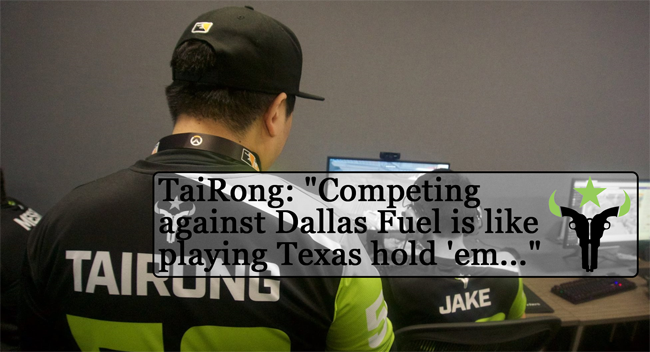
With three weeks of Overwatch League behind us, Houston, surprising both pundits and fans, are now ranked fourth in the standings. The team has been looking better and better with each series and next week fans will see them going against what will be their toughest challenge so far in the face of Seoul Dynasty.
Last week, we had the opportunity to ask the team’s head coach, TaiRong, a slew of questions in regards to his move across to L.A., the evolution of his coaching style, difference between coaching Korean and Western players and a number of Outlaws-related topics.
Author’s note: all answers are translations from Korean to English.

Hello, TaiRong! Before we get into Overwatch-related topics, what's your time in L.A. been like so far? Are you enjoying it, do you miss home, how's the food?
It’s really nice to talk to you. This is my second time here in L.A. as I have been here before for the 2016 Overwatch World Cup. So, with the exception of the unique transportation system here, I’m very familiar with L.A. -- much more so than last year.
In regards to missing home, I pretty much spent my time in Korea with Afreeca Freecs, away from home for an entire year, so I’m fine. I’m spending my time in L.A., in this unique and bright weather, pretty nicely.
For food, instead of immediately looking for Korean food, I visited multiple restaurants and looked for something that I can eat every day regularly. After searching for a couple of days, I decided upon Tex-Mex as my main type of food.
We know that OWL players went through rigorous scrimmages before joining teams, but so far fans have heard very little of what sort of trials coaches had to go through. As someone who's had the experience firsthand, please describe what your hiring process for Outlaws was.
The recruitment process of every player and coach is different depending on the teams.
In the case of Houston Outlaws, the General Manager, Flame, used his experience in the esports scene as the background and realistically looked for esports figures that the organization needed. Using this method, Flame built the team around the player that performed beyond expectations during the NA Contenders S1 Playoffs, FNRGFE. He created a team with high potentials.
Flame’s offer to me for the head coach position was actually quite funny. As he had revealed through his stream, his offer, and my acceptance to that offer, happened almost instantly. There was a risk that both Flame and I took as Outlaws was the first instance of an North American team in OWL having a Korean head coach. Additionally, it was the very first English-speaking team that I had coached -- both Flame and I threw a dice and hoped for the best.
It’s too soon to rate the team’s performance as of now, as we’re still very early on in the tournament. However, I can definitely say that both of us are satisfied with the results so far.
How much input did you and the other coaches in the assemblage of the roster? Was there an overarching theme in the selection of the players?
The foundation of the team was already set in place. Including me, all the coaching staff agreed to it. The entire process happened real quick.
We mostly focused on a players’ skills and their knowledge of the game. We also looked at their abilities of self-reflection, communication with the team without any trouble, and whether or not they are able to synergize with the rest. Those are the factors that were what we looked at mainly.
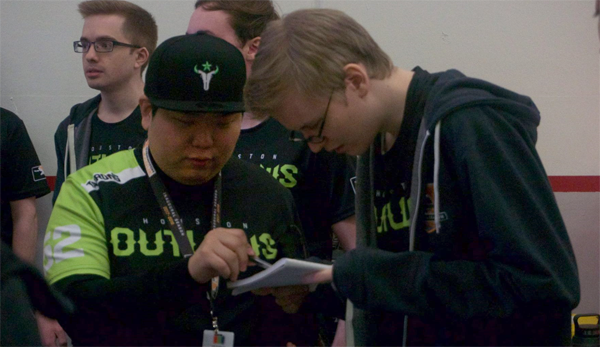
A lot has been said in the public space about the difference between Korean and Western teams. As someone who's worked in both scenes, what are some key differences between the players? Is there some disparity between the way teams and organizations operate?
The biggest difference between the two regions is that: the players and coaches think differently on how they should play in order to take the victory.
For Korean players, they build their teamwork around the “orthodox” strategy that was, or is currently, popular. As for the western teams, they invest their time and effort in creating a strategy that can overthrow that “orthodox” strategy.
As for the second question, since the teams and organizations all have different ways in which they operate, the scale of it is too large for me to actually pinpoint and talk about the differences.
You're well-known for your time in TF2* and I've heard that your experience as a player has helped you come up with a unique coaching style. Please describe for us your coaching style while you were in Korea and how it has changed since you started working with Outlaws.
*OWL commentator DoA, has mentioned TaiRong’s TF2 background on a number of occasions in APEX, while he was casting the games of Afreeca Freecs, TaiRong’s previous team.
I’m well-known for that? I didn’t know! (Laughs) My coaching can be divided into two parts: individual and team coaching. As for my “individual coaching”, when I played TF2 back in the day, my personal goal was to master the medic class. As I started nearing my goal, I wanted to challenge and master the soldier class. But at the time, I wasn’t familiar with any FPS games other than TF2. So it was very difficult for me to win against the top ranking Korean TF2 players.
So in order to improve on the soldier class, I focused on improving my mechanics. I have used over 140 different gaming mice, 50 different mouse pads, and used and experienced 144hz monitors, the type of monitor that wasn’t that popular in Korea [at the time of the release of OW]. So I used that experience of mine to coach the players in regards to [a variety of] “mechanics”. I was able to coach the players in regards to gaming gear on MiG. I think that played the biggest part.
In regards to team coaching, since my experience comes mainly from TF2, in LoL Seasons 1-2, I experienced the gameplay of top-tier players day by day myself and had put that of the most importance to coach my team.
With all that said, it’s the players that played the biggest role, as they had put their faith in me and had listened to my advice.
“In this generation, people who have flexible thinking will be more successful than those who utilize methods that are outdated.”. This is something my father told me that's had impact on the way I coach.
My coaching style now is very different to the coaching style I had back in Korea. Even at this time, I’m slowly shifting my coaching style in order to better coach the different players.
You actually had to coach Outlaws remotely for a period of time. What was that experience like?
The language barrier was a lot bigger and harder to break through than what I had initially expected.
So instead of using talking to the players, I compiled text notes to coach. This lead me to the realization that coaching is best done in person, sitting right next to the players. Coaching remotely has more limits to it than you’d think.

The players mentioned in press conferences that after the first week, you guys changed something about the team's approach to scrims. Please go into a bit of detail what was wrong with the way you practiced beforehand and how it changed.
During the preseason, I wasn’t with the team, so I can’t explain in full detail. However, it wasn’t really the team’s 'approach' to scrims that was a problem, but rather, the team had reached its limits as a “brand new team” -- a limit that is present in almost all newly created teams.
Our first opponent, Philadelphia Fusion… before our game, I thoroughly analyzed the team. Through that research, I concluded that the Fusion players had a completely different style to that of our players. So no matter what the hypothesis I come up with, the simulations in my head came down to both teams having a fierce battle.
At the tie-breaker, we lost a close game with a score of 2-3. But after the match, the coaching staff found the direction that we wanted the team to follow, and that direction proved to be on point. Continuing in the same direction, the team had great results during the following weeks.
Something a number of fans and pundits found interesting is that LiNkzr was getting subbed out during the first week of OWL. Can you please go into the reasons for why he wasn't playing all the matches during week one and what changed coming into week two?
To a certain degree, I’m responsible for the the failure in week 1. As a non-English speaker, I tried to go for a short-term success by using the knowledge that I had, mainly because of the language barrier. I used that failure as a lesson, and I think that’s how our team was able to achieve great results in the following weeks.
A lot of people were impressed with your dominant win over Dallas Fuel, since they were one of the highest-ranted teams going into the season. Given the fact that they're your Texan rivals, was there some specific plan or extra-research the team did for the matchup against them?
In a way, Dallas Fuel and I are actually pretty close. Starting from the APEX S1 Finals to the 3rd place match in S3… And even now, we’re facing each other in OWL. On top of that, the EnVyUs-OpTic rivalry is something that I probably don’t even need to explain to the readers. Of course, I used all my experience and knowledge to make careful predictions and had simulated all the possibilities, but to tell you the truth…
Competing against Dallas Fuel is like playing “Texas hold 'em”. Instead of preparing a counter-strategy to the enemies’, the Fuel’s playstyle involves completely twisting the enemy team’s strategies. While that’s happening, they make their own plays to cement their victory. That is what that team is good at. So in order to compete against them, we used our best strategies that we had prepared beforehand. We clashed and had won the first game, which took place in Junker Town. After that victory, we had the momentum and our players used the opportunity to play confidently. I think that played the most important part. It’s all thanks to the players, really.
Jake seemed to look a lot better on non-Junkrat heroes this week. To what degree is that due to the team playing around him better this week and how much is it him changing something about his game?
While working on Outlaws as the head coach, I mainly focused on individual coaching and giving advice to the players. One of the ones I focused on was Jake. But it wasn’t just him that poured in a lot of effort, his teammates also did their best to find and provide Jake with what he needed. Jake's current self is the result of that progress -- a progress that is still ongoing.

Notably, RJH from Dynasty was vocal about you being a strong team and playing well in practice, even before you got any wins. Is there something different about the way the team performs in practice? Do you think some of the players have a bit of a stage anxiety and still can't perform at their best in the official games?
The players on Outlaws are strong during practice, but we have a number of players that perform even better on stage. There have been numerous moments of which the mentioned players showed plays that far exceeded their usual performance. As a brand new team, the road ahead is still long and tough, but it’s not stage fright that’s limiting the players’ performance.
Are there any specific teams you especially look forward to facing for the rest of 'Stage 1'
There isn’t a specific team that I want to face, but rather, every team - every single one that we have to face - is special to me. OWL is really different, the environment is very special since even the underdogs are teams that you can’t underestimate.
Since OWL is still quite new and outsiders don't know much about the way teams operate, can you please indulge us and share what Outlaws' daily schedule looks like.
The OWL’s schedule is really tight and we had to adapt to a busy schedule. We are still trying to come up with a daily schedule that isn’t too much of a hassle for the players -- including the schedule of their free time. So it will be hard for me to say anything in detail about it as of now.
The final words are yours.
I am doing my best to bring great performance and results to our fans - and I will continue to do that. Even when the players are having a hard time, please put your faith in them and warmly cheer for them. Thank you.
If you’d like to keep up with TaiRong and the Houston Outlaws, you can do so on Twitter at respectively @TaiRongOW and @OutlawsOW. For extra video content, including conferences, highlights and the team’s ‘Focus’ series, check out Outlaws’ youtube channel.
(Photo credits: Activision Blizzard, Houston Outlaws, Inven)
About the author:
Hello readers, I go by the ID RadoN! I’ve been following different games within the esports industry ever since finding out about it in 2009. The titles that I follow closely for the time being are Overwatch, CS:GO and Quake, while occasionally dabbling in some other games as well. If you wish to reach out, follow future content, or simply know more about my thoughts on esports and gaming, you can find me on Twitter at @RadoNonfire.
Sort by:
Comments :0


